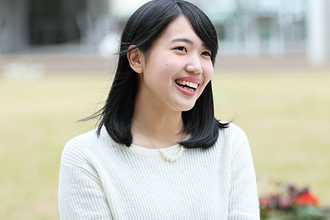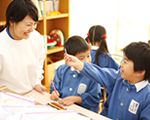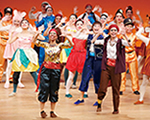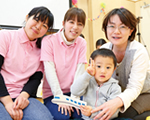Department of Early Childhood Education
Developing the compassion and techniques of childcare
professionals who help bring out children’s potential

What you will study in the Department of Early Childhood Education
The department offers a choice of the Expression and Music Course and the Psychology and Environment Course to meet students’ needs and objectives. The Expression and Music course centers on expressive power and music and the Psychology and Environment Course focuses on child rearing support activities and children’s outdoor experience. Both courses in the Department of Early Childhood Education help students to acquire ability to develop children’s sensitivity and fulfill their potential.
Four Points of Study
-
1
- Select one of the two courses that best fits your specialized fields
 The main feature of this department is that students are able to select one from two courses which suits them. The Expression and Music Course and the Psychology and Environment Course are offered so that students can select courses that best foster their good qualities and link them to future professions.
The main feature of this department is that students are able to select one from two courses which suits them. The Expression and Music Course and the Psychology and Environment Course are offered so that students can select courses that best foster their good qualities and link them to future professions.
-
2
- Acquire practical techniques in the well-equipped facility
 Students study childcare techniques in the well-equipped facilities, consisting of a “Childrearing Support Room” and a “Childcare Training Room.” A kindergarten and nursery school affiliated with the college provide a place where students receive practical training. These facilities provide plentiful opportunities for first-hand experience in childcare settings.
Students study childcare techniques in the well-equipped facilities, consisting of a “Childrearing Support Room” and a “Childcare Training Room.” A kindergarten and nursery school affiliated with the college provide a place where students receive practical training. These facilities provide plentiful opportunities for first-hand experience in childcare settings.
-
3
- Presentation of results from the 2-year program on a big stage
 Students in the Expression and Music Course present what they’ve learned with musical drama, music ensembles and other performances on a stage in a hall that seats 800. The first-year students also join in the performance, which help them polish their expressive, planning and management skills.
Students in the Expression and Music Course present what they’ve learned with musical drama, music ensembles and other performances on a stage in a hall that seats 800. The first-year students also join in the performance, which help them polish their expressive, planning and management skills.
-
4
- Experience “childrearing support” on campus
 Mothers and small children are invited to the college to participate in a childrearing support project called the “Mother-Child Lively Circle.” Students in the Psychology and Environment Course sing with, read to and interact with children and their parents right on the campus. This is an opportunity for students to have on-site experience working with children and their parents.
Mothers and small children are invited to the college to participate in a childrearing support project called the “Mother-Child Lively Circle.” Students in the Psychology and Environment Course sing with, read to and interact with children and their parents right on the campus. This is an opportunity for students to have on-site experience working with children and their parents.
Skills acquired in the 2-year program
-
- Diverse expressive techniques to express feelings
- In order to help children improve their expressive skills, the students themselves must learn methods of expression. Students study and are encouraged to enhance their expressive skills through music, dance and words.
-
- Practical skills to shape ideas
- There are many opportunities to put out ideas and shape them through events and activities. The experience of getting out ideas and creating something from them in a team will be useful in childcare settings.
-
- Cooperativeness and compassion
- There are opportunities for first- and second-year students to work together. Cooperating with one another enhances communication skills, which will be useful in working with children.
-
- Physical Expression Course
- Physical Expression Course includes dance and music lessons. A musical event is held as a culmination of students’ work. Through the event students gain performance and imagination skills, and obtain a sense of accomplishment.
-
- Psychology and Environment Course
- Psychology and Environment Course includes practical classes which aim to foster talent that is useful in environmental education from early childhood and the scene of child support. Through the studies students gain management skills in nursery schools, learning attitude, sense of empathy and sensitivity to others and the environment.








